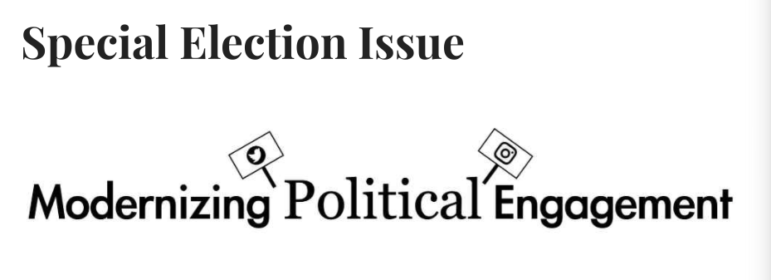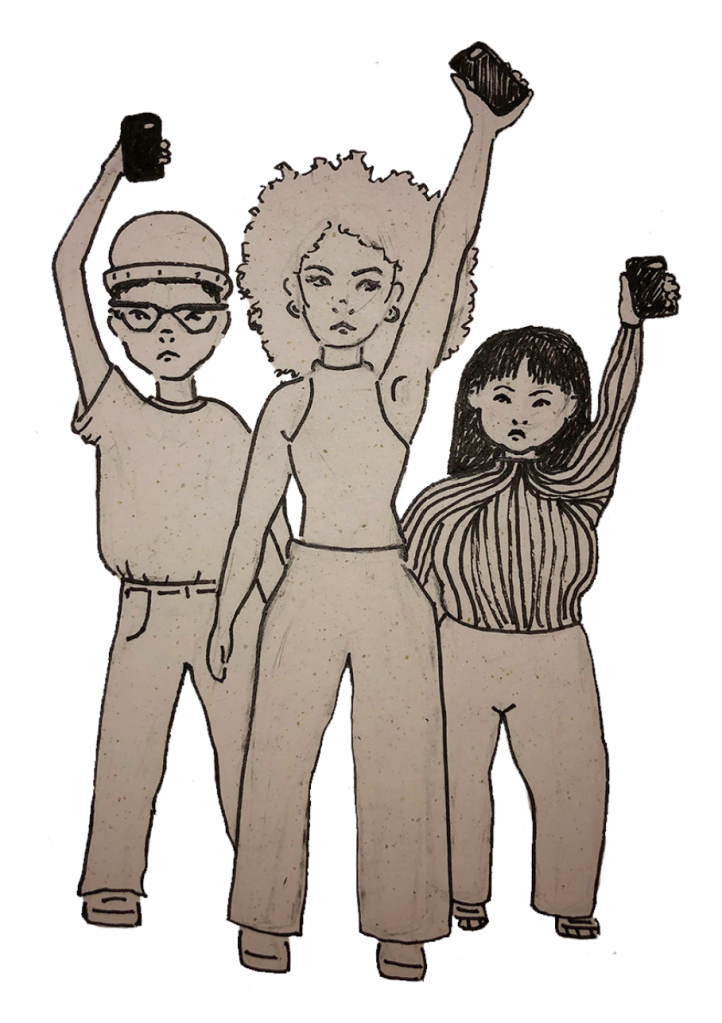The dedicated staff of Columbia High School’s award-winning student newspaper, The Columbian, proudly present their third online edition at chsthecolumbian.com. The following article “Modernizing Political Engagement” by Lindsay Gross, Opinions Co-Editor of the Columbian and member of the Class of 2021, was originally published by The Columbian on Oct. 31, 2020. With permission from CHS administration and staff at the newspaper, Village Green will be posting more content from the current issue of The Columbian in the coming weeks.

Policies, values, opinions and beliefs are constantly changing, producing differences in opinions between people of different generations. There is an ongoing trend of Gen-Zers (1996-2012) and Millennials (1981-1996) being more liberal in thinking than older generations, such as Gen-Xers (1965-1979) and Baby Boomers (1946-1964). This trend presents itself in the known-to-be liberal community of Maplewood and South Orange (MAPSO).
According to Bestplaces, Essex County has voted Democratic by a strong majority in the five most recent elections. Joseph Lucchetta, Columbia High School (CHS) ‘85 graduate and teacher, and Jennifer Klepesch, lifelong resident of Maplewood and CHS graduate of ‘89, both agree that the MAPSO community is more liberal today than when they were at CHS. Klepesch said, “I certainly agree that the youth community is more active, more political, and more liberal than when I was at CHS.” CHS students lead strikes, protests, movements and frequently voice their opinions on social media platforms. Ben Christman, ‘21, added, “I believe this country’s youth is more involved than ever, and I love it. More than the older generations for sure.”

The increase of social media usage has created a vast platform for younger generations to express and promote their beliefs and political opinions. Young people are able to use social media platforms to their advantage and reach a variety of people, something that older generations did not have during their childhoods. Carol Fardin, a local realtor and resident of Maplewood stated, “I think back at my youth and wish that my generation could have been more involved and engaged — and it may be that we didn’t have the platform of social media to do this.” Instagram, Tiktok, Twitter and Facebook are all relatively new platforms that have become key sources of political debate and youth civic engagement. Each of these platforms have been created in only the past 16 years. Social media and other forms of technology have provided the public with easily accessible information, which the youth have been able to use to dictate their engagement and involvement in issues that resonate with them, locally or globally.
Since one must be 18 to vote, much of the CHS student body is ineligible to participate in politics through the direct act of voting. It is easy to ignore what’s going on if one is not directly affected or feels like they have no impact. However, young people are taking action in forms of community organizations, volunteering, protesting and holding marches. According to The New Yorker, youth political participation has been increasing throughout the years. The Center for Information and Research on Civic Learning & Engagement at Tufts University concluded that over 30% of eligible voters between the ages of 19 and 29 voted in the 2018 election, making it the highest youth turnout since 1982. Students have become more involved in reform movements such as Black Lives Matter, the March for our Lives and local Climate Strikes after recent injustices regarding school shootings, police brutality and a perceived lack of commitment to protecting the environment.

According to The Atlantic, it is a common belief that children take after their parents beliefs, behaviors and ideologies. Sarah Klepesch, ‘21, commented, “My political beliefs are definitely in line with my parents. They have raised me in a Democratic household which has shaped my outlook on politics.”
MAPSO encompasses people of various racial and socioeconomic backgrounds, leading to a wide range of thought and differentiating values. As beliefs often stem from one’s environment, many students in MAPSO find that they create their own opinions with no association to their parents. “My parents and I disagree on almost every issue,” stated Priya Pai, ‘22.” My political beliefs do not align in the slightest.” Pai considers herself more liberal than her parents, stating they are far more conservative in their beliefs.
Day-to-day, news is changing, beliefs are altered, and opinions are being voiced. With the 2020 election impending, the winner of the presidency can still be decided. Due to generational divide, increasing the electorate is imperative for a fair election and sustaining a representative democracy. The youth vote can ensure this by continuing to voice their opinions and casting their ballot on Nov. 3.

